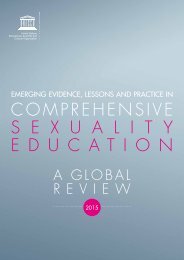Teacher
1WrsFvH
1WrsFvH
You also want an ePaper? Increase the reach of your titles
YUMPU automatically turns print PDFs into web optimized ePapers that Google loves.
VIII. Employment terms and working<br />
environments<br />
Although enhancing the quality of early childhood<br />
teachers is an essential prerequisite for increasing<br />
the quality of the education they deliver, the nature<br />
and range of the benefits they receive and of the<br />
environment in which they work are also a major<br />
contributor to educational quality.<br />
18. Where applicable, Southeast Asian countries may need to make efforts to ensure that<br />
status, employment benefits and working conditions of early childhood teachers<br />
are equivalent to those of primary school teachers with the same qualifications and<br />
experience. They are also encouraged, where applicable, to ensure that early childhood<br />
teachers have the same civil service and contractual status as well as salaries that are<br />
commensurate with their primary education counterparts.<br />
Achieving this goal, of course, requires consideration of<br />
the relative working hours (hours spent with children<br />
and non-contact hours) as well as the qualifications<br />
and competency requirements of teachers in early<br />
childhood and primary education.<br />
a) Contract status: One of the major ambitions of many<br />
aspiring teachers is to attain civil service status and<br />
employment stability, with the work and retirement<br />
benefits this usually entails. This possibility is often<br />
less likely for early childhood teachers since many are<br />
working in private, NGO-sponsored or communityfunded<br />
programmes. In Malaysia, for example, 20%<br />
of early childhood teachers are reported to be civil<br />
servants, compared to 80% of primary teachers.<br />
However, as government-funded early childhood<br />
systems expand in number and size, a major condition<br />
that can attract more and better applicants into early<br />
childhood education is the awarding of a status<br />
equal to that of primary education counterparts. For<br />
example, in Cambodia, pre-schools/kindergartens are<br />
formally attached to primary schools, thus providing<br />
stability and equality in status and pay. It is also the case<br />
for the Philippines, where kindergarten is compulsory<br />
and the mandated first stage of elementary education,<br />
In trying to improve early childhood teachers’<br />
employment terms, full-time and long-term contracts<br />
— if not permanent — are clearly preferable to parttime<br />
and shorter-term contracts, which many teachers<br />
accept, in the absence of other options. Countries<br />
are encouraged to work with relevant government<br />
agencies or bodies to establish guidelines and<br />
contracts that use fair terms and do not exploit<br />
teachers. Although the class time of ECCE programmes<br />
in some countries may be shorter than that of primary<br />
education, at the very least a set amount of teachers’<br />
non-contact time for planning, class preparation,<br />
assessments and/or participation in CPD should also<br />
be considered as working hours. This will vary from<br />
country to country. For example, the Philippines and<br />
Thailand provide early childhood and primary school<br />
teachers with 10 hours of non-class time per week<br />
for lesson planning, class preparation, staff meetings,<br />
etc. Early childhood and primary school teachers in<br />
Brunei Darussalam and Cambodia are allowed 4 and<br />
4.5 hours of non-class time per week for planning,<br />
respectively.<br />
b) Salary: both the amount and the regularity of their<br />
payment are obviously a very important incentive<br />
for attracting more qualified teachers into ECCE.<br />
Salaries can be relatively generous in high-quality,<br />
private early childhood systems, which often attract<br />
effective teachers away from the government<br />
system. However, not all private early childhood<br />
schools provide higher salaries. For example, in the<br />
Philippines, teachers in the private sector mostly<br />
receive about 75% of a public school teacher’s salary.<br />
In general, salaries are lower for programmes run by<br />
communities, NGOs, faith-based organisations and<br />
not-for-profit private systems. The latter systems, on<br />
the other hand, often provide other non-material<br />
incentives for teachers, such as community support,<br />
solidarity, and opportunities to reinforce ethnic,<br />
18



